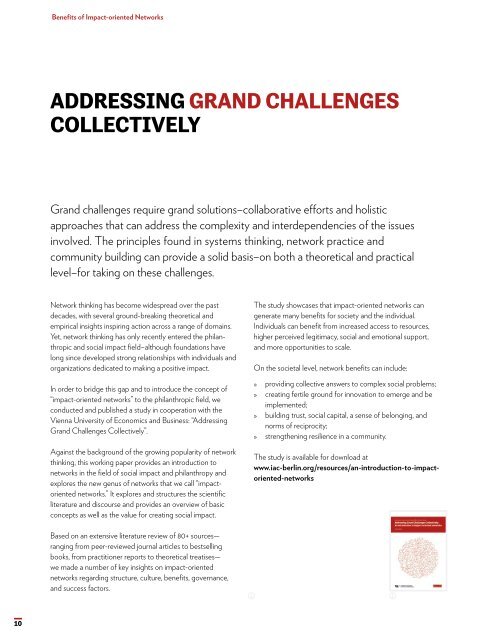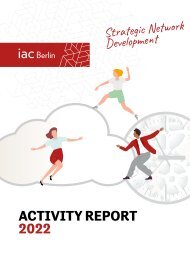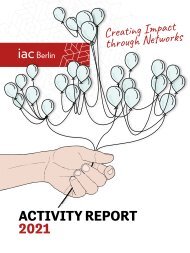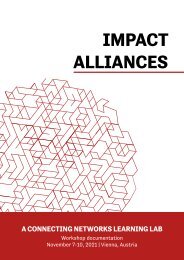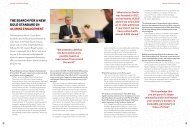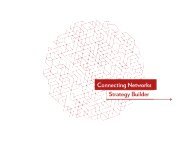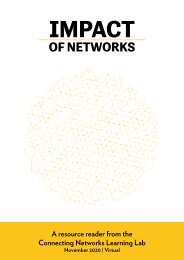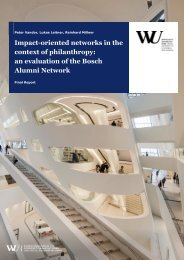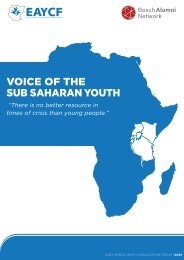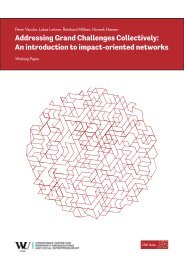iac Berlin - Activity Report 2020
iac Berlin - Activity Report 2020
iac Berlin - Activity Report 2020
You also want an ePaper? Increase the reach of your titles
YUMPU automatically turns print PDFs into web optimized ePapers that Google loves.
Benefits of Impact-oriented Networks<br />
Benefits of Impact-oriented Networks<br />
ADDRESSING GRAND CHALLENGES<br />
COLLECTIVELY<br />
LEARNING LAB:<br />
THE IMPACT OF NETWORKS<br />
Grand challenges require grand solutions–collaborative efforts and holistic<br />
approaches that can address the complexity and interdependencies of the issues<br />
involved. The principles found in systems thinking, network practice and<br />
community building can provide a solid basis–on both a theoretical and practical<br />
level–for taking on these challenges.<br />
Network thinking has become widespread over the past<br />
decades, with several ground-breaking theoretical and<br />
empirical insights inspiring action across a range of domains.<br />
Yet, network thinking has only recently entered the philanthropic<br />
and social impact field–although foundations have<br />
long since developed strong relationships with individuals and<br />
organizations dedicated to making a positive impact.<br />
In order to bridge this gap and to introduce the concept of<br />
“impact-oriented networks” to the philanthropic field, we<br />
conducted and published a study in cooperation with the<br />
Vienna University of Economics and Business: “Addressing<br />
Grand Challenges Collectively”.<br />
Against the background of the growing popularity of network<br />
thinking, this working paper provides an introduction to<br />
networks in the field of social impact and philanthropy and<br />
explores the new genus of networks that we call “impactoriented<br />
networks.” It explores and structures the scientific<br />
literature and discourse and provides an overview of basic<br />
concepts as well as the value for creating social impact.<br />
Based on an extensive literature review of 80+ sources—<br />
ranging from peer-reviewed journal articles to bestselling<br />
books, from practitioner reports to theoretical treatises—<br />
we made a number of key insights on impact-oriented<br />
networks regarding structure, culture, benefits, governance,<br />
and success factors.<br />
The study showcases that impact-oriented networks can<br />
generate many benefits for society and the individual.<br />
Individuals can benefit from increased access to resources,<br />
higher perceived legitimacy, social and emotional support,<br />
and more opportunities to scale.<br />
On the societal level, network benefits can include:<br />
» providing collective answers to complex social problems;<br />
» creating fertile ground for innovation to emerge and be<br />
implemented;<br />
» building trust, social capital, a sense of belonging, and<br />
norms of reciprocity;<br />
» strengthening resilience in a community.<br />
The study is available for download at<br />
www.<strong>iac</strong>-berlin.org/resources/an-introduction-to-impactoriented-networks<br />
Continuing on our belief in the benefits of impact-oriented networks, the <strong>iac</strong> <strong>Berlin</strong><br />
and the Porticus Community Arts brought together the Connecting Networks<br />
community for a virtual Learning Lab on the impact of networks. Connecting Networks<br />
is a community of peers with more than 50 network-builders from 30 organizations<br />
across Europe. Its members are shaping their shared journey, contributing questions,<br />
expertise, practices, and support to create a program and tools to help us all make<br />
a greater impact.<br />
The lab featured speakers with diverse backgrounds, who were<br />
able to contribute a wide range of perspectives on the topic of<br />
network impact:<br />
Gerald Wirth, president and artistic director of the Vienna<br />
Boys Choir, opened the lab with warm-up exercises that built<br />
human connections through song.<br />
Peter Vandor, a senior researcher and manager of<br />
the Nonprofit Organization & Social Entrepreneurship<br />
Competence Center at the Vienna University of Economics<br />
and Business, provided insights on network impact from recent<br />
academic research.<br />
Margaret Wheatley, co-founder and president of the<br />
Berkana Institute, contributed her unique experience as a<br />
consultant for leadership, culture change and organizational<br />
forms based on living systems.<br />
Werner Binnenstein-Bachstein, director of the<br />
Porticus Community Arts Lab, shared practical experiences<br />
from the development and work of the Community Arts<br />
Network.<br />
And finally, Vinzenz Himmighofen, a coordinator of<br />
the Bosch Alumni Network at <strong>iac</strong> <strong>Berlin</strong>, was joined by Peter<br />
Vandor to discuss the structure and culture of the network,<br />
and how they evaluated its impact based on a non-linear<br />
understanding of impact measurement (see pages 36/37 for<br />
details).<br />
The lab was an invaluable opportunity to go deep into a topic<br />
that is challenging for many network-builders, whether it’s<br />
reporting to boards or funders, communicating impact to the<br />
public or even explaining the work to colleagues. This reader<br />
provides summaries of the resources used during the lab as<br />
well as links to additional materials shared by the Connecting<br />
Networks community.<br />
The reader is available for download at<br />
www.<strong>iac</strong>-berlin.org/resources/learning-lab<br />
10<br />
11


